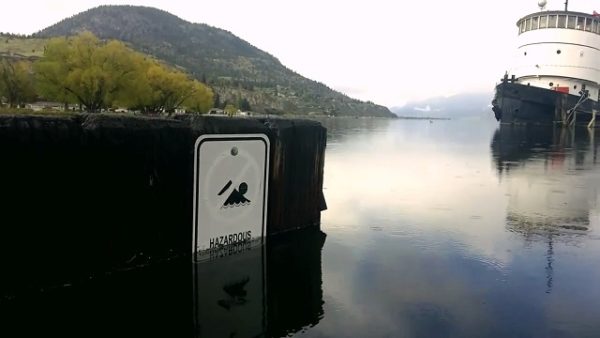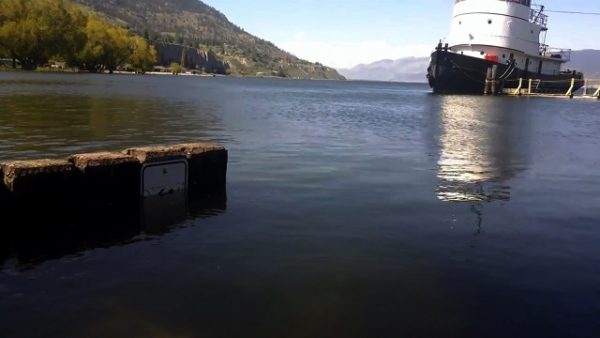
 Okanagan lake flooding is making some think we have a new normal.
Okanagan lake flooding is making some think we have a new normal.
As relief efforts for last month’s flooding are winding down in Ontario and Quebec, attention is now turned to the BC Interior, where unseasonably warm weather combined with above average snowpacks have created flood risks for a handful of rivers and raised Okanagan Lake to dangerously high levels.
Such events are a sign of the times, say the experts, who now argue that climate change’s impact on our freshwater lakes and rivers will be one of extreme fluctuations in water levels over shorter spans of time.
Flood watches are currently in effect for the South Thompson and Shuswap rivers of BC’s southern Interior, with high streamflow advisories in effect for the North Thompson, Thompson and Slocan Rivers as well. For the Okanagan region, BC’s Ministry of Forests reports that at least half of the upper level snowpacks that feed the area’s streams, rivers and lakes have yet to melt, meaning that the water level in Okanagan Lake may not reach its peak until mid-June.
“It’s pretty scary,” says Kelowna Mayor Colin Basran. “But we’re pretty fortunate so far that the protection that’s put in place is doing its job.” The city operates a drainage system that can lower the lake level by as much as 11 centimetres a week, but officials say that even with that precautionary measure, flooding along the shoreline is likely to continue. “It all depends on if it rains hard, or if it’s hotter than predicted,” says city manager Ron Mattiussi to the Province. “It’s not an exact science.”
While global warming is causing the world’s oceans to warm and sea levels to rise, it’s having an impact on freshwater systems, too — just not how you might think.
While experts have long predicted that a hotter planet will produce more evaporation of lake water and a continual lowering of lake levels, in fact, the consensus is now that higher water levels and flooding will also become part of the new normal.
“There is a wide range of effects on lakes and rivers in Canada due to climate change,” says Emma Lui, water campaigner for the Council of Canadians, to Cantech Letter. “In the Northwest Territories, some lakes have nearly doubled in size. We see low water levels in regions that have experienced drought such as BC in 2015 and Southern Ontario in recent years. Surface water temperature of the Great Lakes have been rising and winter time ice formation levels like on Lake Superior have decreased in recent decades.”
David Phillips, senior climatologist with Environment Canada, spoke to Cantech Letter about the effects of climate change on our lakes and rivers, saying that, overall, continual warming of the atmosphere is going to produce more dramatic swings in weather which will translate into more highs and lows for our freshwater systems.
“If you look over the records for the past century and more, you see some peaks and valleys but generally more long periods of stability,” says Phillips. “But now, for example, recently within a span of about 20 months, the Great Lakes went from a record low to a record high.”
Indeed, the United States National Oceanic and Atmospheric Administration forecasts that water levels in all of the Great Lakes are likely to be at or above seasonal averages this summer. Phillips says that whereas five to ten years ago, scientists assumed that global warming would result in continually lower water tables in our lakes, the more accurate prediction now is one of high variability. Changes to the jet stream, for example, are resulting in slower moving storm patterns, meaning that some areas will get hit with lots of precipitation for days on end, unlike in the past when such storms would blow over within a day. “It’ll be a challenge for water users, which is all of us, to deal with the unpredictability and extremes. We’d like to have enough time after one major weather concern before having to respond to the next one, but that’s not going to be the case,” says Phillips.
That sentiment is echoed by Mark Fisher, Chief Executive Officer of the Council of the Great Lakes Region, who says that climate change and global warming are coming with a host of issues for lake systems, from fluctuating water levels to the introduction of new species and stresses on native ones. “From a management standpoint, it’s going to be a lot harder to adjust with that amount of variability,” says Fisher to Cantech Letter. “And for those living on flood plains, as well, as we’ve just seen, there’s going to be a lot more exposure to risk.”
Fisher says, “One of our main concerns going forward is that there needs to be more emphasis on the science and modelling of climate change and how it’s expected to impact the Great Lakes.” “We need that knowledge to inform policy and management,” says Fisher.

The world’s freshwater lakes are already warming at a rate faster than the oceans. According to a 2015 study from York University in Toronto, where the oceans are getting increasingly warmer by 0.12 degrees Celsius per decade and the air is warming by 0.25 C per decade, lakes around the world are warming by 0.34 C. Higher latitude lakes are even more affected, with the study finding that Canadian lakes increasing by 0.72 C per decade.
Scientists say that higher lake temperatures translate into poorer water quality, as algal blooms form in higher quantities and toxins persist in greater concentrations. At Lake Erie, which has been plagued by suffocating algae blooms in recent years, the US and Canadian governments have agreed to cut the amount of phosphorus runoff that reaches the lake by 40 per cent, hoping to stem the tide of green algae slime that has become a serious threat to drinking water and created “dead zones” in the lake where fish can’t survive. Phosphorus from agricultural fertilizers feeds the algae and creates the toxic plumes.
The rising sea levels are themselves going to impact lakes and rivers, too, says Phillips. “We’re going to see more salt water intrusion into fresh water supplies,” says Phillips. “We’ve underestimated how quickly the ocean levels are actually going up, and this realization is really the big news right now.”
Below: Okanagan Lake flood timelapse, Penticton BC
Leave a Reply
You must be logged in to post a comment.




 Share
Share Tweet
Tweet Share
Share




Comment